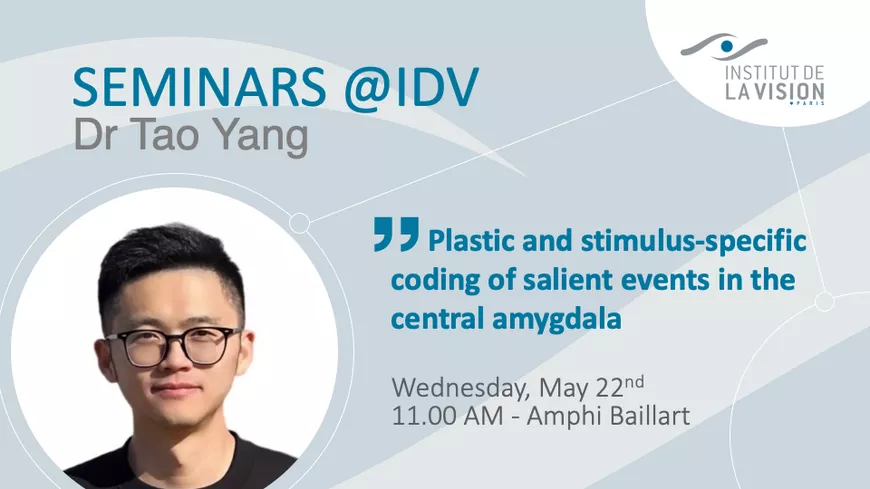Plastic and stimulus-specific coding of salient events in the central amygdala
Invited by Nicolò Accanto, Dr Tao Yang (Westlake University, China) will speak on Wednesday May 22 at 11am. Meet in the Amphithéâtre Bailliart, 3rd floor of the Hôpital national des 15-20.

Abstract
The central amygdala (CeA) is implicated in a range of mental processes including attention, motivation, memory formation and extinction, and in behaviors driven by either aversive or appetitive stimuli. How it participates in these divergent functions remains elusive. Here we show that somatostatin-expressing (Sst+) CeA neurons, which mediate much of CeA functions, generate experience-dependent and stimulus-specific evaluative signals essential for learning. The population responses of these neurons in mice encode the identities of a wide range of salient stimuli, with the responses of separate subpopulations selectively representing the stimuli that have contrasting valences, sensory modalities, or physical properties (e.g., shock and water reward). These signals scale with stimulus intensity, undergo pronounced amplification and transformation during learning, and are required for both reward and aversive learning. Notably, these signals contribute to dopamine neurons’ responses to reward and reward prediction error, but not to their responses to aversive stimuli. Consistently, Sst+ CeA neuron outputs to dopamine areas are required for reward learning, but are dispensable for aversive learning. Our results suggest that Sst+ CeA neurons selectively process information about differing salient events for evaluation during learning, supporting the diverse roles of the CeA. In particular, the information for dopamine neurons facilitates reward evaluation.
About Tao Yang
Dr. Tao Yang earned his Bachelor’s degree from the Department of Electronic Engineering at Xidian University in 2010 and completed his Ph.D from the Department of Biomedical Photonics at Huazhong University of Science and Technology in 2015. After completing his Ph.D., he switched to neuroscience and joined Dr. Bo Li’s Lab at Cold Spring Harbor Laboratory as a postdoctoral researcher. During this period, he developed a deep brain imaging system for single-cell resolution imaging, addressing crucial questions related to deep brain regions in cognitive function. His research uncovered unique functions of the central amygdala
(CeA), a structure that has received intense investigation in recent decades. This work helps explain the diverse roles of the CeA, especially its role in reward learning, and also provides in vivo evidence for the long-standing hypothesis that the CeA regulates midbrain DA neurons.
Dr. Tao Yang is currently an assistant professor at Westlake University in China, where he has established the Laboratory of Systems Neuroscience and Biomedical Photonics.
